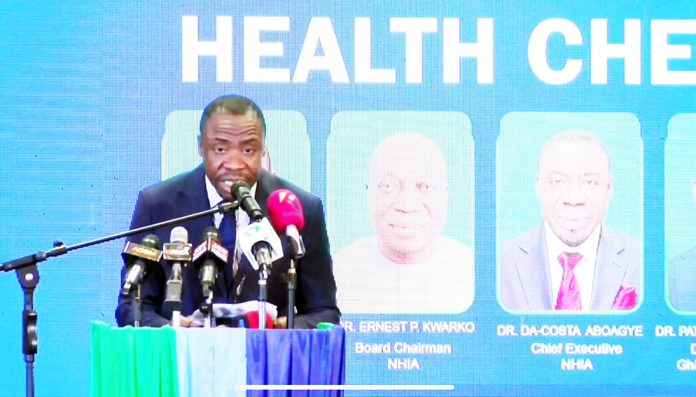In a story published on page 2 of today’s issue of The Chronicle, the National Health Insurance Scheme (NHIS) is reported to have launched free Annual Health Check-Ups (AHC) to tackle the burden of Non-Communicable Diseases (NCDs) in the country.
The AHC, which is for 18 years old and above registered with the NHIS and with the Ghana Card, aims to identify potential health issues at an early stage through comprehensive screenings, including blood pressure management, blood sugar testing, body mass index checks and counseling.
The first phase of the program will be implemented nationwide, providing accessible services at designated public and private health facilities.
To be able to enroll in this service, eligible beneficiaries will be required to contact the NHIS by dialing a USSD short code (which is to be announced soon) during their birth month to generate an Access Ticket on their mobile phones.
Addressing the gathering at the launch ceremony, Dr. Ernest K.P. Kwarko, Board Chairman of the National Health Insurance Authority (NHIA) emphasised that the free annual health check-up program embodies NHIA’s commitment to promoting preventive healthcare and ensuring that all citizens have access to essential health services.
Dr. Kwarko highlighted the increasing global recognition of preventive healthcare’s importance, noting that early detection and intervention can prevent serious health conditions, reduce the burden of diseases and improve quality of life.
He urged all citizens to take advantage of the free service, stressing that preventive healthcare is crucial for leading healthier lives.
The Chronicle would like to commend the NHIA for bringing about such an initiative to help address Non-Communicable Diseases such as diabetes, hypertension and cancer.
Hypertension and diabetes, two of the most significant contributors to morbidity and mortality, have reached epidemic proportions. In Ghana, hypertension tops all adult hospital admissions and is associated with a significant proportion of overall adult deaths. Of particular concern is the hike in hypertension cases among younger adults who constitute majority of the working population in Ghana.
Also, there are misconceptions and poor knowledge of hypertension in Ghana, even among patients living with hypertension, which is why this initiative is again commendable.
According to statistics, currently, the prevalence of hypertension is reported between 27% and 34%. On average, one in four adults in Ghana has hypertension. Nearly, less than 35% are aware of their status with only 22% on treatment. In 2021, over 5 million people in Ghana had hypertension.
This initiative is indeed a commitment to promoting preventive healthcare and ensuring equitable access to essential health services for all citizens.
Non-communicable diseases have become a formidable challenge for Ghana, contributing to over 40% of all post-mortality cases, as highlighted by Dr. Patrick Kuma Aboagye, Director General of the Ghana Health Services. The alarming increase in cancer cases, rising from 16,000 in 2016 to 24,000 by 2020 and the surge in childhood cancer rates to 40% of all cancers underscore the urgency of addressing these health issues. The introduction of the AHC program is a proactive response to this growing health crisis.
Dr. Ernest K.P. Kwarko rightly pointed out that preventive healthcare is globally recognised for its importance. Early detection and intervention can prevent serious health conditions, reduce the burden of diseases and improve the quality of life.
The AHC program is designed to identify potential health issues at an early stage, allowing for timely treatment and management. This initiative not only focuses on testing but also on educating the population about healthy lifestyles and preventive measures.
The broader goals of the AHC program are ambitious yet achievable. Increasing life expectancy and reducing the cost burden of curative healthcare are critical objectives. As Dr. Kwarko emphasised, the core drivers of the current healthcare cost burden are hypertension and diabetes.
By focusing on early detection and preventive care, the AHC program aims to alleviate this financial strain on the healthcare system. Additionally, future plans to introduce interventions like Pap smear tests for women demonstrate the program’s commitment to comprehensive healthcare.
The significance of this program cannot be overstated. Moreover, the program’s emphasis on preventive healthcare is a strategic move towards building a healthier and more productive nation. As Dr. Kwarko aptly put it, preventive healthcare pushes us towards a healthier life.
By participating in the free annual health check-up program, citizens are not only safeguarding their health but also contributing to a healthier nation. This initiative is expected to pave the way for more innovative healthcare strategies in the future, ultimately transforming Ghana’s healthcare system.
The financial implications of untreated NCDs are staggering. The estimated cost of treating breast cancer in Ghana is $20,145 per patient, while the lifetime cost of treating hypertension is around $119,000. These figures highlight the economic burden of NCDs on individuals and the healthcare system.
This initiative sets a precedent for future healthcare strategies, demonstrating that proactive health measures can lead to a healthier and more prosperous nation. Together, we can build a healthier future for Ghana.









